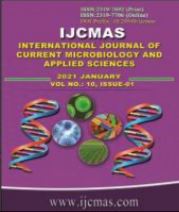


 National Academy of Agricultural Sciences (NAAS)
National Academy of Agricultural Sciences (NAAS)

|
PRINT ISSN : 2319-7692
Online ISSN : 2319-7706 Issues : 12 per year Publisher : Excellent Publishers Email : editorijcmas@gmail.com / submit@ijcmas.com Editor-in-chief: Dr.M.Prakash Index Copernicus ICV 2018: 95.39 NAAS RATING 2020: 5.38 |
F.oxysporum is so wide spread, it is a significant problem in many crops. It is economically damaging to the banana industry, and the threat of more virulent strains or mutations to damage previously resistant crops is of major concern. F. oxysporum also causes damage to many crops from the family Solanaceae, including potato, tomato, and pepper. Yield losses of effected crops can be high, up to 45% yield loss of tomato crop has been reported in India. Therefore, present in vitro study was planned and conducted in vitro, in 8 treatments replicated thrice, to assess the efficacy of fungicides against Fusarium oxysporum f.sp. lycopersici, at the Department of Plant Pathology, College of Agriculture, Dhule (MS), during 2018-2020. Results revealed that the fungicides Mancozeb + Carbendazim (0.125% + 0.05%) inhibited 100 per cent growth of pathogen followed by Thiram + Carbendazim (0.15% + 0.05%) which inhibited 93.63 per cent, Carbendazim (0.1%) inhibited 92.13 per cent, Thiram (0.3%) inhibited 89.5 per cent, Carboxin (0.2%) inhibited 87.25 per cent, Captan (0.25%) inhibited 81.13 per cent, Propiconazole (0.2%) inhibited 67.50 per cent and Mancozeb (0.25%) inhibited 62.25 per cent growth of pathogen F. oxysporum f.sp. lycopersici.
 |
 |
 |
 |
 |